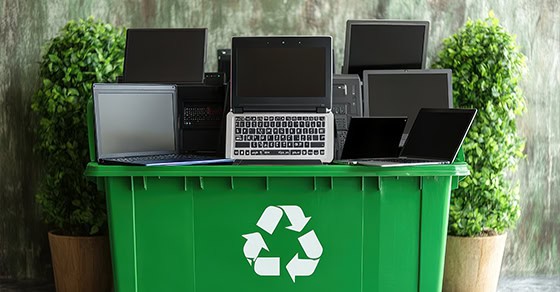
Electronic devices are essential in today’s world of constant connectivity. These tools, ranging from simple phones and computers to complicated industrial systems, improve our lives. Nevertheless, this progress in technology has brought about a major environmental problem: electrical trash, or e-waste. The improper handling of e-waste, which includes all old electrical devices, can be very harmful to both people and the environment. Computer Recycling is leading the way in addressing this problem by setting the standard for responsible e-waste handling. The business’s ability to handle old computers, composed of a variety of materials, is crucial.
The amount of electronic trash in the world is huge, and it keeps growing at an incredible rate. As technology advances and newer models emerge, people frequently discard older devices, including computers, adding to the growing amount of e-waste. Too often, these old electronics, especially computer monitors, end up in dumps. There, they have the potential to leach harmful toxins into the groundwater and dirt, affecting ecosystems, wildlife, and possibly even joining the food chain. These toxins can accumulate over time, causing irreversible damage. Computer Recycling recognizes the importance of this problem and dedicates itself to its prevention.
E-waste is a complicated mix of materials and dangerous chemicals. E-waste includes hazardous substances like lead, mercury, cadmium, beryllium, and brominated flame retardants, even though the recovery of valuable metals like gold, silver, and copper from computers is economically advantageous. These toxins can harm your brain, cause growth problems, lead to different types of cancer, and hurt your internal systems. Mishandling of e-waste, like burning it or recycling it without following the rules, makes these problems worse by releasing chemicals into the air and making the environment even worse. A controlled and regulated method for handling these dangerous materials and preventing their release into the environment is provided by Computer Recycling’s specialized processes, which directly address these risks.
The environmental effects of poor e-waste dumping, especially of computers, go far beyond local contamination. The manufacturing of new gadgets uses a lot of energy and resources, including mining for raw materials, which has negative environmental consequences. These mining activities have the potential to lead to land erosion, water pollution, and deforestation. Computer recycling helps restore natural resources by carefully recycling e-waste and computer products, reducing the demand for these resources, and lowering the environmental impact of manufacturing new products. This also helps protect wild areas and lessens the bad effects of mining. Additionally, recycling lowers the energy needed to create new materials, which further reduces the environmental impact.
Effective computer recycling is a complicated, multi-step process. To ensure the safe and effective handling of e-waste, Computer Recycling uses cutting-edge infrastructure and highly trained people. The first step is to gather and organize the devices. Next, devices are taken apart and their parts are carefully divided. Dangerous materials, which are often found in computers, are carefully taken out and cleaned to prevent environmental pollution. This could mean using special methods to get rid of mercury or safely getting rid of parts that contain lead. Lastly, recyclable materials, like metals and plastics, are processed and improved for reuse in new products, ending the loop and promoting a circular economy.
Along with the direct environmental benefits, recycling computers also has big business benefits. The recovery of valuable materials produces income streams, and the e-waste recycling industry, with businesses like Computer Recycling at the forefront, creates jobs. Recycling also helps lower manufacturing costs by reducing the need for new materials. It also supports a circular economy, which means that resources are used for as long as possible.
For responsible e-waste handling to happen, consumers are critical. Individuals should actively seek out approved e-waste recyclers like Computer Recycling or participate in maker take-back programs rather than simply throwing away old computers. To protect privacy, it is also essential to delete all sensitive information before recycling devices. To ensure total data deletion, use data-wiping software or physically damage the hard drive. We can add to a more sustainable and environmentally sound future by being smart about how we dispose of our gadgets, particularly computers. The importance of responsible computer recycling is promoted by Computer Recycling through consumer education and awareness.
It is impossible to overestimate the importance of computer recycling as a key part of responsible e-waste management. It is essential for promoting a sustainable economy, protecting human health, and conserving natural resources. As a leader in the field, Computer Recycling is committed to offering responsible and effective ways to deal with electronic trash. We can lessen the harmful effects of electronic devices and make the world a better place for future generations by adopting responsible e-waste management practices, including professional computer recycling services. To ensure that e-waste, especially computer waste, is managed responsibly and that its potential harms are minimized, it is a shared duty that requires the combined efforts of individuals, companies, and governments. Working together to raise awareness, educate, and make recycling tools easy to use, we can solve this rising problem and use computer recycling to make the world a better place. To make the future more sustainable, it is also important to support laws that encourage responsible recycling of electronic trash and hold companies accountable for the whole lifecycle of their products. In this attempt, Computer Recycling is the leader.


